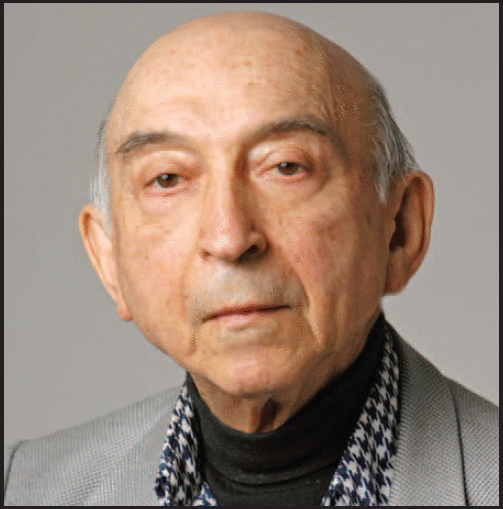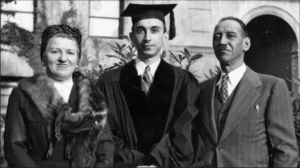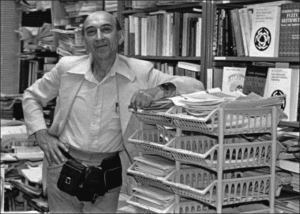How Great was Lotfi Zadeh?: A Fuzzy Tribute to an Influential Figure in Computing

Lotfi Zadeh, professor of electrical engineering and computer science, whose theory of fuzzy logic and fuzzy sets significantly influenced the science and industry of computers, passed away last month at his home in Berkeley, California.
A member of IEEE since 1947, Zadeh was awarded the IEEE Certificate of Appreciation in 1988, the Richard W. Hamming Medal “for seminal contributions to information science and systems, including the conceptualization of fuzzy sets” in 1992, and the IEEE Medal of Honor “for pioneering development of fuzzy logic and its many diverse applications” in 1995. Between 1998 and 2000, he was a Distinguished Visitor, speaking on topics, such as “The Roles of Soft Computing and Fuzzy Logic in the Conception, Design, and Deployment of Intelligent Systems,” and “From Computing with Numbers to Computing with Words.”
A Fuzzy Tribute
During the early to mid-2000s in Baku, Azerbaijan, Zadeh’s birthplace, I managed a U.S. State Department program that integrated the Internet and computers into education, which brought me to schools in cities and towns throughout the country. Often on my visits, math teachers would approach me to talk about the program and the opportunities for the growth of computer science in the country, and invariably the conversation would turn to one question: “Do you know our great engineer, mathematician and computer scientist, Lotfi Zadeh?”
The question itself was Boolean (yes-or-no, a pure on-off option), but the assessment of his greatness fit more into the area of the fuzzy logic that had been pioneered by Zadeh himself, and brought us neuro-fuzzy systems, methods of earthquake prediction, anti-lock brakes and smooth starting/stopping systems for trains.
 Zadeh was born in Baku in 1921 to two Iranian citizens: his father was a journalist on assignment in the newly established Azerbaijan Soviet Socialist Republic, and his mother was a physician. Zadeh’s family moved to Tehran in 1931, where he studied in an English Presbyterian school and later (1942) graduated from the University of Tehran. He received his PhD. from Columbia University in 1949 with a dissertation on Frequency Analysis of Time Varying Networks.
Zadeh was born in Baku in 1921 to two Iranian citizens: his father was a journalist on assignment in the newly established Azerbaijan Soviet Socialist Republic, and his mother was a physician. Zadeh’s family moved to Tehran in 1931, where he studied in an English Presbyterian school and later (1942) graduated from the University of Tehran. He received his PhD. from Columbia University in 1949 with a dissertation on Frequency Analysis of Time Varying Networks.
Fuzzy Sets and Information Theory
After receiving his PhD., Zadeh was hired by Columbia to teach network analysis and information theory, which—since its inception—had been dominated by Boolean logic, with the flip-flop circuit as its guiding metaphor.
Zadeh understood the challenge created by such a conceptual framework for people working in the field. When dealing with vague concepts like beauty, tallness or even the classification of living organisms, he wrote in his 1965 article, “More often than not, the classes of objects encountered in the real physical world do not have precisely defined criteria of membership.” For Zadeh some categories had no clear flip or flop. Rather, they existed somewhere between the extremes of absolute membership and absolute non-membership—a continuum between 0 and 1.
For instance, in defining Zadeh as great, where does the concept of greatness begin and ordinariness end? If absolute greatness (having minstrels three hundred years from now sing a person’s deeds) were assigned the number 1, and being forgotten the moment the person left the room were 0, then average greatness or ordinariness (being remembered only by family, friends and colleagues) would exist somewhere in the middle (at perhaps .5). Moreover, a person who approached absolute greatness—say at .8—would have ordinariness of .2.
Such scaling enables our determining the placement of an individual into these fuzzy sets. In fact, Zadeh imagined the sorting of individuals into fuzzy sets, something we did all the time. He wrote, “…such imprecisely defined ‘classes’ play an important role in human thinking in the domains of pattern recognition, communication of information and abstraction.” Every year, students define their teachers as good or bad, and people assign attractiveness or unattractiveness to a person on TV, in movies or just on the street, despite a lack of clear mathematical division between these classes.
It might be best to think of fuzzy logic in terms of a conversation about gradations of wrongness between Sheldon Cooper and Stewart Bloom on TV’s The Big Bang Theory. Sheldon, ever the Aristotelian, imagines being wrong as a binary question: either correct or incorrect, while Stewart offers a more fuzzy classification: “It’s a little wrong to say a tomato is a vegetable; it’s very wrong to say it’s a suspension bridge.” Stewart, then, might assign a value of 1 to “saying a tomato is a suspension bridge,” whereas he might give “saying it is a vegetable” a grade closer to .5.
In the field of Systems Analysis, Zadeh believed fuzzy logic could overcome the problems of dealing with complexity. Boolean or Aristotelian logic, he offered, could provide precise definitions of “a linear system, a stable system, a time-invariant system, etc.” But such logic was limited in defining a “decentralized system, a slowly-varying system, a reliable system, etc,” which he believed to be the domain of fuzzy logic.
Fuzziness and Its Discontents
 Undoubtedly, the math teachers I spoke with in Azerbaijan estimated Zadeh’s fit into the category of “great” with a grade much nearer to 1 than 0. But the estimation of his greatness might have varied over time and across individuals.
Undoubtedly, the math teachers I spoke with in Azerbaijan estimated Zadeh’s fit into the category of “great” with a grade much nearer to 1 than 0. But the estimation of his greatness might have varied over time and across individuals.
The fuzziness of his logic, particularly the term “fuzzy” itself, had made his theory controversial. Zadeh had expected his paper to draw “a mixed reaction,” since the word “fuzzy” tended to be “used in a pejorative sense, but, more substantively, because unsharpness of class boundaries was not considered in science and engineering.” Zadeh had little concern about the resistance to his idea. In fact, nonconformity had been a mainstay to his personality. A photograph in an article for the journal of Applied Computational Mathematics depicted Zadeh beneath a sign in his study that read “Один” (meaning, one or alone) in Russian, which he explained “was a proclamation of my commitment to nonconformity—a commitment which I adhered to throughout my life.”
One of fuzzy logic’s detractors, Robert Kalman, called “Fuzzification…a kind of scientific permissiveness” that “tends to result in socially appealing slogans unaccompanied by the discipline of hard scientific work and patient observation, and viewed Zadeh’s fuzzy logic not “as a viable alternative for the scientific method….”
Another of the theory’s opponents, William Kahan suggested that fuzzy logic could not solve any problems that Boolean logic could not tackle. He imagined its danger lay in the fact that it would “encourage the sort of imprecise thinking that has brought us so much trouble.”
Zadeh’s Minstrels
Despite resistance to Zadeh’s theory, it had managed to attract a number of supporters. The theory spread to academia in China, Japan and Korea, and was subsequently picked up by industry, most notably in the creation of the smooth start/stop system of the Sendai Subway.
In the U.S., Bart Kosko sought out Zadeh to be an advisor on his dissertation in the 1980s. Since then, Kosko has utilized fuzzy sets and fuzzy logic to create fuzzy cognitive map models for examining support for insurgency and terrorism.
There may not be epic poems written about Lotfi Zadeh, but we might consider the more than 90,000 scholarly works that cite his 1965 paper, the IEEE Computer Society members who attended his Distinguished Visitor Program lectures from 1998 to 2000, the people writing articles like this one, and the math teachers in Azerbaijan as his minstrels.
Therefore, whether you prefer your logic Boolean or fuzzy, there is no denying Zadeh’s influence on the industry, academia, and society.
All photos in this article were originally published in “Interview with Professor Lotfi A. Zadeh [Career Profile]” IEEE Computational Intelligence Magazine (Volume: 6, Issue: 4, Nov. 2011 ). pp. 13 – 17. (http://ieeexplore.ieee.org/document/6052364/)

Leave a Reply